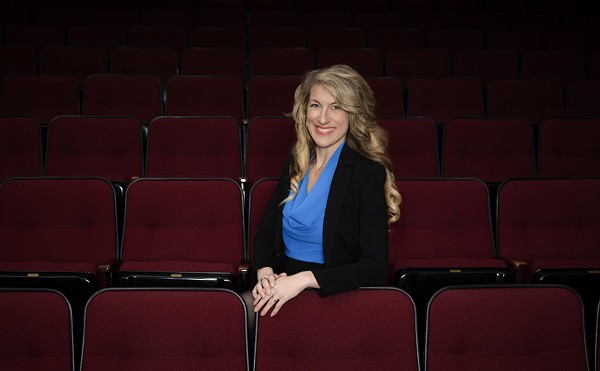Perhaps because the cast is enormous. Or perhaps the old gal was sandbagged by the clunky movie version with Katharine Hepburn. An even grimmer possibility is that Madwoman's roseate view of life is simply out of sync with today's mean-spirited times. Whatever the reason, in recent decades the myopic Countess Aurelia has been allowed to lapse from sight. So what a treat to see her again presiding over her small corner of Paris, engaging in a struggle to the death against the seemingly unstoppable forces of greed and power.
Although the story concerns those who would dominate the world and those who would keep it free, Madwoman is not a parable about war. Rather, it is a warning about peace. Written in 1944, as World War II was winding down, the play is a reminder that war leaves even the victors exhausted. In the flush of peace, people must be especially vigilant, for this is when they are most prone to lose their focus and once again revert to reactionary suspicion and selfishness.
Though the issues here are clear-cut, staging the script is a chore. There's little action. Mostly people sit at tables and talk, talk, talk. But this spare Stray Dog Theatre production unreels its fable clearly and cleanly. With a keen appreciation for the space at her disposal, director Eleanor Schwetye effectively moves 24 actors around the stage without the slightest sense of clutter. Glenn Dunn's subtle yet active lighting design draws you into another world -- without spelling out where that world is.
The vivid costumes by Alex Fennell (with a program credit to the St. Louis Rep costume department) provide the evening with an antic tone. Consider, for instance, the black-and-white striped suit worn by Tim Kidwell, persuasively unctuous as the villainous President. (No names, please; all the bad guys are prototypes.) The President's boldly striped suit infers that he's ready to enter the nearest prison, or perhaps has just been released from one.
Among the large cast, Richard Lewis is especially amusing as the Prospector. Who knew it would only take a Stetson hat to turn "Tex" Lewis into a kissin' cousin to Kenny Rogers? As the flighty Broker, Myron Freedman reminds one of a dazed bird who's just flown into a window. And as one of Aurelia's dotty cronies, Diane Peterson suggests that there is sanity in madness. Or is it madness in sanity?
Then there is the Madwoman herself. Twenty-three minutes into Act 1, an apparition appears onstage. Is it a bulbous lampshade? No. Despite the fact that the play is set in the spring, we are gazing upon a lavender Christmas tree. It is strewn with strands of pearls rather than popcorn; tinsel hangs from every limb. And at the top of the tree, where the angel should be, sits Donna Weinsting's virtuous, smiling face.
But this phantasmagorical costume is only the beginning. Weinsting then proceeds to create a quite original Countess. Rather than play into the role's eccentricities, she instead brings a lovely touch of reality to the Madwoman. If the world is no longer beautiful or happy, we share that sense of betrayal through her sorrowful eyes. Weinsting succeeds in bestowing credibility on an incredible character. Her graceful high-wire act helps to transform the evening into a veritable night at the circus.
One caveat: Despite the fact that so much has been done right here, most of the taped music cues are obvious and unnecessary. The piano accompaniment that plays under the Ragpicker's (Bradley Calise) important speeches at the end of Act 1 ("We are the last of the free people of the earth") is especially distracting. It should be cut entirely -- and immediately. The real music in The Madwoman of Chaillot is in the words. Let us hear them.





